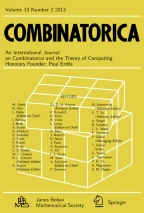Abstract
For any countably infinite graph G, Ramsey’s theorem guarantees an infinite monochromatic copy of G in any r-coloring of the edges of the countably infinite complete graph Kℕ. Taking this a step further, it is natural to wonder how “large” of a monochromatic copy of G we can find with respect to some measure - for instance, the density (or upper density) of the vertex set of G in the positive integers. Unlike finite Ramsey theory, where this question has been studied extensively, the analogous problem for infinite graphs has been mostly overlooked.
In one of the few results in the area, Erdős and Galvin proved that in every 2-coloring of Kℕ, there exists a monochromatic path whose vertex set has upper density at least 2/3, but it is not possible to do better than 8/9. They also showed that for some sequence εn → 0, there exists a monochromatic path P such that for infinitely many n, the set (1,2,...,n contains the first \(\left(\frac{1}{3+\sqrt{3}}-\epsilon_n\right)n\) vertices of P, but it is not possible to do better than 2n/3. We improve both results, in the former case achieving an upper density at least 3/4 and in the latter case obtaining a tight bound of 2/3. We also consider related problems for directed paths, trees (connected subgraphs), and a more general result which includes locally finite graphs for instance.
Similar content being viewed by others
References
P. Allen, B. Roberts and J. Skokan: Ramsey numbers of squares of paths, Electronic Notes in Discrete Mathematics 49 (2015), 637–641.
F. Benevides, T. Luczak, J. Skokan, A. Scott and M. White: Monochromatic cycles in 2-coloured graphs, Combinatorics, Probability, and Computing, 21 (2012), 57–87.
C. Berge: Graphs and Hypergraphs, second revised edition, Amsterdam: North-Holland Publishing Co., 1976.
C. Chvatál, V. Rödl, E. Szemerédi and W. T. Trotter: The Ramsey number of a graph with bounded maximum degree, Journal of Combinatorial Theory, Series B 34 (1983), 239–243.
J. Corsten: Personal communication.
M. Elekes, D. Soukup, L. Soukup and Z. Szentmiklóssy: Decompositions of edge-colored infinite complete graphs into monochromatic paths, Discrete Mathematics 340 (2017), 2053–2069.
P. Erdős: Some remarks on Ramsay’s theorem, Canadian Mathematical Bulletin 7 (1964), 619–622.
P. Erdős and F. Galvin: Some Ramsey-type theorems, Discrete Mathematics 87 (1991), 261–269.
P. Erdős and F. Galvin: Monochromatic infinite paths, Discrete Mathematics 113 (1993), 59–70.
P. Erdős, A. Gyárfás and L. Pyber: Vertex coverings by monochromatic cycles and trees, Journal of Combinatorial Theory, Series B 51 (1991), 90–95.
I. Farah: Semiselective coideals, Mathematika 45 (1998), 79–103.
L. Gerencsér and A. Gyárfás: On Ramsey-type problems, Ann. Sci. Budapest. Ëotvös Sect. Math 10 (1967), 167–170.
H. Guggiari: Monochromatic paths in the complete symmetric infinite digraph, manuscript, arXiv:1710.10900, (2017).
A. Gyárfás: Partition covers and blocking sets in hypergraphs, MTA SZTAKI Tanulmányok 71, 1977.
A. Gyárfás and J. Lehel: A Ramsey-type problem in directed and bipartite graphs, Periodica Mathematica Hungarica 3 (1973), 299–304.
A. Gyárfás, M. Ruszinkó, G. Sárközy and E. Szemerédi: Three-color Ramsey numbers for paths, Combinatorica 27 (2007), 35–69.
A. xGyárfás and G. Sárközy: Star Versus Two Stripes Ramsey Numbers and a Conjecture of Schelp, Combinatorics, Probability and Computing 21 (2012), 179–186.
A. Gyárfás, G. Sárközy and E. Szemerédi: The Ramsey number of diamond-matchings and loose cycles in hypergraphs, Electron. J. Combin 15 (2008), #R126.
P. Haxell, T. Luczak, Y. Peng, V. Rödl, A. Ruciński and J. Skokan: The Ramsey number for 3-uniform tight hypergraph cycles, Combinatorics, Probability and Computing 18 (2009), 165–203.
P. Haxell, T. Luczak, Y. Peng, V. Rödl, A. Ruciński, M. Simonovits and J. Skokan: The Ramsey number for hypergraph cycles I, Journal of Combinatorial Theory, Series A 113 (2006), 67–83.
M. Hrušàk: Combinatorics of filters and ideals, Set theory and its applications 533, Contemp. Math., Amer. Math. Soc, Providence, RI (2011), 29–69.
P. Komjáth and V. Totik: Problems and theorems in classical set theory, Springer Science & Business Media (2006).
J. Komlós, G. Sárközy and E. Szemerédi: Blow-up lemma, Combinatorica 17 (1997), 109–123.
J. Komlós and M. Simonovits: Szemerédi’s regularity lemma and its applications in graph theory, Bolyai Society Mathematical Studies 2, Combinatorics, Paul Erdős is Eighty (Vol. 2), Budapest (1996), 295–352.
D. Kühn and D. Osthus: Embedding large subgraphs into dense graphs, arXiv:0901.3541, (2009).
M. Las Vergnas: Sur l’existence des cycles hamiltoniens dans un graphe, CR Acad, Sci. Paris, Sér. A 270 (1970), 1361–1364.
S. Letzter: Path Ramsey number for random graphs, Combinatorics, Probability and Computing 25 (2016), 612–622.
A. R. D. Mathias: Happy families, Ann. Math. Logic 12 (1977), 59–111.
A. Pokrovskiy: Partitioning edge-coloured complete graphs into monochromatic cycles and paths, Journal of Combinatorial Theory, Series B 106 (2014), 70–97.
R. Rado: Monochromatic paths in graphs, Ann. Discrete Math 3 (1978), 191–194.
F. P. Ramsey: On a problem of formal logic, Proc. London Math. Soc., 2nd Ser. 30 (1930), 264–286.
H. Raynaud: Sur le circuit hamiltonien bi-coloré dans les graphes orientés, Periodica Mathematica Hungarica 3 (1973), 289–297.
E. Szemerédi: Regular Partitions of Graphs, Colloques Internationaux C.N.R.S -Problèmes Combinatoires et Théorie des Graphes 260 (1976), 399–401.
Z. Tuza: Ryser’s conjecture on transversals of r-partite hypergraphs, Ars Combinatoria 16 (1983), 201–209.
E. L. Wimmers: The Shelah P-point independence theorem, Israel Journal of Mathematics 43 (1982), 28–48.
Acknowledgements
We thank the referees for their detailed reports, especially for providing a simplification of our original proof of Theorem 1.12.
Author information
Authors and Affiliations
Corresponding authors
Additional information
Research supported in part by Simons Foundation Collaboration Grant # 283194.
Rights and permissions
About this article
Cite this article
DeBiasio, L., McKenney, P. Density of Monochromatic Infinite Subgraphs. Combinatorica 39, 847–878 (2019). https://doi.org/10.1007/s00493-018-3724-2
Received:
Revised:
Published:
Issue Date:
DOI: https://doi.org/10.1007/s00493-018-3724-2
